- Home
- M G Vassanji
A Delhi Obsession Page 6
A Delhi Obsession Read online
Page 6
“You two did not look happy to me,” she blurted out, and it came as a bombshell. “That’s why I chose to go away.”
She had chosen to hurt him, puncture that new condition she had applauded in him only moments ago.
“Every marriage has its bad moments. Sporadic arguments don’t make for an unhappy life together.”
“I saw a coldness, a frigidity in the air between you two.”
“A temporary condition. I’m sorry. We should have shielded you better.”
“A sibling would have helped. I longed for a brother. Did you ever think of that?”
“It wasn’t possible.”
* * *
—
Aileen McKellar had been on the panel that interviewed Munir Khan for his job at the bank. Slim with short brown hair, in a fitted yet conservative green dress. There were three men and her, a junior, who asked him only one question, why his interest in working for a bank. Later, when he stayed late at work, she would be there and would come over to chat. Hardly the start to a passion. No, he was lonely, away from home, she rebounding from a wound—twenty-five years together was enough to bring on this realization—but they’d managed as contented a life together as any couple in their stable, middle-class neighbourhood with plenty of kids who had now all grown up and gone away. They liked and cared for each other, the more so as they grew older—was that love? Surely yes, of a kind. There were accommodations, more on his part, but he was the immigrant. He had to adjust to her punctiliousness—everything about her was tidy and exact. Their house was like a hotel, he would complain, not the tiniest rumple on a cushion, not a wayward pleat on a curtain, the table laid with geometric precision; but it was always pleasant. She was on the bank’s curling team, he went away to play tennis. She had choir and went occasionally to church, he went to his room to write. She grew to enjoy curry, though admittedly when much of Toronto had also learned to do so. The Cricket Club put a brand on their solidity. One child was necessary, she said, another one was not. Okay, he said.
Now she was gone and he was sitting in front of that necessary child, having justified that relationship. The cushions looked rumpled on the long sofa where Razia had stretched out last night. He would attend to that. He liked to keep the house ordered, as much as possible, in Aileen’s memory. And because he was now used to having it that way. He missed her. Pathan and Scot, they’d called themselves. On the map of India, recently, he had seen a city name that sounded just like that: Pathankot.
Razia’s voice, sounding far away, brought him back to the present. “Yes?” he asked.
“I’ve met someone.”
“Oh. That’s nice. What’s his name?”
Those eyes at him. That guilty smile he remembered, before a confession.
“Dad…”
“Well?” he asked, getting anxious. “Is it a secret?”
“Actually, I got married.”
“Really? And—” She was not joking. “You’re not…you can’t—”
“Dad, we thought we’d go it alone initially, without family…and follow with a big reception with ceremonies later.”
What do you say to that, Aileen? What would you have done? Is it me?—our darling would not have gone off and got married without telling, had you been around. For a long while he did not speak.
“All right…” he said.
“You didn’t care for rituals yourself.”
Did I ever say that? But we gave you birthday parties, with clowns and jugglers, and we gave you Christmas trees and the tooth fairy, those were rituals…
“You’re hurt.”
“What’s his name, this lucky fellow?”
“His name is Mark Goldstein. And he’s a philosophy professor.” She burst out laughing. “Imagine me marrying a professional philosopher! You should have seen how we met. But we love each other. Passionately.”
“And does he walk about with frazzled hair, looking dreamy…”
“Sometimes.” She laughed lightly this time, delighted just to recall her guy.
“I’m happy for you, Razia.” He got up and took her in his arms. “Will I meet him—or isn’t that necessary?”
“We’d like you to come to New York and meet him.”
“I’d love to. But now, let’s have lunch…” He quickly brushed his wet eyes and went to smooth the rumpled cushions. “To remember her,” he explained unnecessarily. “She’d have been delighted at your news.”
She smiled her thanks at him. “And Dad—I can’t have lunch with you, I’m meeting a few friends from school downtown. But shall we go out for dinner, you and I?”
“Of course, and don’t worry about me.”
“I won’t,” she said, then kissed him on the cheek and went off, beaming.
He watched her back out and drive off, and then himself went out for his walk.
* * *
—
She’s got married, surely that’s significant. So casual? Her friends had large weddings, destination weddings in exotic places, and his own daughter, his one and only, just walks to a judge with her philosopher boyfriend and gets married? And then wants a big ceremony afterwards. What?—a mullah and a nikah, a mukhi and a rabbi? A sibling would have helped, are you listening up there, Aileen, your daughter has gotten married. And I’m aching.
He passed the young Indian couple’s house. Their Audi was in the driveway, they must be in. Just then a mature woman (time to use that term) emerged and closed the door behind her. She was rather heavy-set and wore ill-advised pants with a blouse. One of the mothers, he surmised. As they passed, impulsively he said, “Namaste!” She looked up, startled, then responded likewise and smiled warmly.
Back home, his mood lifted by that act of spontaneity, he sat down and turned the TV on, went to the multicultural channel. An Indian film was on, as he expected, and he watched what remained of it, a good two hours. It was a silly movie, but he enjoyed it nonetheless. He had started watching these Saturday features only recently. He had watched a very few as a child, but these newer ones were colourful and often violent and risqué, he’d noticed with surprise, though in the end all got reconciled in front of the gods and the evil ones received their just dues.
He felt a pull. Should he call her. But it would be well past midnight there. And there was the husband. It was time to nip it in the bud, this fantasy, this impossibility. It could only cause pain. And yet how could he forget her, the promise they had made. Shall I write to you? Of course you can! Don’t act the Mr. Darcy! He had written her a longish email letter, compromising, juvenile, bathetic. And she had replied. I miss you. I think of you all the time. Who had written that? Both of them, probably. After that, a few texts, one hurried phone call.
He was aware that something else had happened to him in Delhi. Something had awakened in him. The historian. The poet. The Sufi, the sultan. All calling to him. Saying what? Write.
He went up to his study. Outside it, next to the door, was a pile of books he had ordered on the internet, which Razia had unpacked for him and neatly arranged. He picked them up. A history of the Delhi sultanate by Ziauddin Barani, whose grave lay at the Sufi shrine with a solitary rose upon it. An anthology of the works of Amir Khusrau— the poet whose lavish mausoleum lay next to his Sufi master’s, outside which musicians sang ecstatically from his works. And the life and times of the sheikh, Sufi Nizamuddin himself. All Indian editions. He sat down to look at them. After his first novel was published, Aileen had turned the room into a proper study for him, with a desk and chair, a leather armchair, where he now sat, a flexi-lamp, and two walls of shelves. But he’d produced only two further works here, a short novel and a story collection, and then stopped. He could see no relevance to anything around him in his work. Inspiration dried up, and he became a disappointment.
He picked up the Barani, flipped through it, returned to the introduction and the lines that had pa
rticularly unsettled him. Muslim kings, the historian wrote, “should not spare any effort in humiliating, degrading, and insulting the idolatrous and polytheist Hindus.” So startling in its bluntness. But this was seven hundred years ago and the opinion of one man. Two hundred years after that they were burning heretics at the stakes in Europe, and soon after, Muslims and Jews were expelled from Spain. Still, it bothered him, a jingoist statement from someone so passionate about the science of history.
He had read that the term “Hindu,” derived from the name of the river Indus, originally referred to the natives of that area. That included those who had opted to follow Islam. Only later had it begun to acquire its rigid exclusivity. The population of Afghanistan, where his paternal ancestors came from, had been mainly Buddhist originally. His mother’s people came from Gujarat, where the current prime minister of India was from. What was Munir Khan, then? “Asian” had been good enough in Nairobi. Now art moved him; music and literature. That was his worship, there lay his gods. He had been happily, willingly deracinated. Now, with a visit to Delhi, his grandfather’s city, he was saddled with this question: was he a Muslim? But did that—whatever it meant—matter? It seemed to matter very much in India. Everyone had a brand, and that indelible brand carried a violent history from the time of Barani that still mattered centuries later. Your people ruled us for seven centuries, as Mohini had said so casually. It was a troubling reminder. My people were goldsmiths, they ruled nobody, just created beautiful objects working with their hands, using their imagination.
* * *
—
Six weeks after Razia left, Munir visited New York to meet his son-in-law. Razia had insisted she would pay for his hotel in Manhattan, and he had to yield. This was her show. His room overlooked Broadway and he was a block away from Lincoln Center, where a few enticing musical programs were on offer that weekend. Razia had made reservations at a French restaurant nearby where they would have dinner and he would meet her young man the philosopher. Before that, at six, he and Razia sat in the hotel bar downstairs to chat. She wanted to know about their family, at least the essentials, as she put it. Not that it mattered much to her or Mark, but his family were curious. So was she, now. She had already been to Glasgow during a visit to the UK and met Aileen’s folks on her mother’s side. It had not been a happy experience; she’d been a teenager and she found her relatives uncouth. From her descriptions, Munir had understood that the family was working class, and the privileged girl from Toronto was not used to such a life. One of her cousins called her names. They drank a lot. To top that, she had a hard time understanding their speech.
Munir had never met the McKellars himself, Aileen preferring they keep their families at a distance. He had, however, once met a cousin of Aileen’s in Toronto. His own elder sister, Khadija, was also in Toronto.
Munir informed his daughter that his Dada, his grandfather Yunus Ali Khan, came from Delhi, but the family was originally from Peshawar, which was now in Pakistan. After their marriage, Dada and Dadi had emigrated to Kenya under somewhat mysterious circumstances. Dada was a goldsmith and owned a jewellery store in Nairobi. Munir’s father, Jehangir, had dropped out of architecture school and helped to run the family business. His mother’s family was from a city called Jamnagar in India. As for religion—both his grandparents were devout, but not his father. His mother came from a Shia community and went to her prayer house once a month. In spite of its humble origins, his family’s life in the British colony when he was a boy had been rather privileged.
“There it is. But you need carry no baggage from the past.”
“It’s good to know. I’m often asked where I am from, what I am, and I find myself at a loss.”
“Now you know.”
“But what about you, Dad. Does Kenya mean anything to you now?”
“One never forgets one’s childhood home.”
“But you rarely mentioned it when I was young. I wish you had.”
“I was making a new life, with your mother and you. It seemed best not to dwell on the past. Though I did dwell on it in my books—which you never read.”
She smiled. “I promise, I will. Still, you could have spoken about your early life. And India? Does it mean anything to you?”
He paused, then said, “It does, now that I’ve visited it…”
He realized that she was waiting for more, and ventured, “It was always that mysterious place in the past, where things had happened…where my grandfather came from. We saw it as a poor, backward place.”
Munir and his siblings had been told that it was economic opportunity that brought their grandfather to Kenya. Yet they were aware there was something else too: those sudden odd looks between Dada and Dadi, and the pauses mid-sentence when “Laard Hardinge Street” happened to be mentioned.
They got up and crossed the road to the restaurant. Mark was already seated at their table midway in the room, eyes fixed on the entrance. He stood up—lanky and professorial with grey eyes and a head of curls, the curious father-in-law observed—and greeted Munir with a shake of hands and “Delighted to meet you, sir.” They sat down and Munir found himself facing the young pair. Passion, she had said, love. He didn’t want to speculate on the relationship, put it through the cynical lens of adult experience. She was happy now, and that’s what mattered. He felt happy seeing her this way, and was moved as only a parent can be at seeing a child at a significant crossroads, venturing out.
He was called upon to describe Razia when she was young, and he told them how until she was three she would prefer to speak Tagalog to them, having picked it up from her nanny, Ophelia, and how in protest at having to practice piano she would go downstairs in the middle of the night and play the scales and arpeggios. There were many incidents, all delightful in retrospect. They discussed the upcoming wedding reception, for which the couple had picked early fall as the time. It was then that Munir wondered if the civic wedding had not been undertaken because Razia was already pregnant. He did not ask.
What did he want to do tomorrow, they asked. He would go to MOMA, he said, and then the opera if there were tickets. Werther was on and he was rather keen. Mark said he would inquire about complimentary tickets from a friend who worked at one of the investment banks. She would call in the morning, Razia said.
It was a brisk early-spring night, the streets were crowded, taxis sped by, all occupied and ignoring the raised arms at the sidewalks. He crossed the road to his hotel. In his room it felt suddenly very quiet and calm, and he went to his laptop. He stared at the screen, at his current unfinished project whose nature he had yet to determine, and after a minute or two of stillness he closed the top. He undressed and got into bed with Barani’s history, which he had brought with him. He read a few paragraphs about the grim death of Sultan Alauddin in 1296 and the truly horrific murder of his son Khizr Khan; he mused about the two lovers, the prince Khizr and the Gujarati princess Deval. He set aside the book, turned off the reading light and fell instantly asleep.
He was in India. A man was sitting on his haunches, his legs folded under him, and he wore a cotton kurta embroidered at the neck. He had a rich black beard on his round, beaming face, and he had a round turban on his head. Incongruous even in dream, he wore a pair of rimless glasses. There was a large book in front of him with hand-written pages.
“What have you written in that book, Sheikh?” Munir asked.
“I have written a secret history of Delhi in the time of Sultan Alauddin Khilji, the Second Alexander.”
“What have you called it?”
“I have called it ‘A Chronicle of the Last Days of Delhi.’ ”
“…”
“Read,” the sheikh said to Munir. “Read this history, in the name of God the Merciful, and tell the world about it.”
Munir woke up with a start, not sure where he was, then heard the sound of a truck on Broadway. His pulse was racing. What had
he been about to say to the sheikh? In what language?
The next morning Razia called and asked him how he slept. She had some work and surely he didn’t need her to distract him at the museum, and he said no, he would manage. They would meet later anyway, and perhaps Mark would have found tickets for the opera; then they should have dinner together. He spent a good two hours wandering about in the museum, then made use of the dining lounge, where she called him again. Could they meet outside Lincoln Center at six? Apparently Mark had found tickets. Munir was elated.
At six, dressed for the occasion, he wandered about the plaza at the Center until he saw them approaching, hand in hand. A handsome couple. Were we as beautiful as the young ones of today? She wore the black shawl he had brought for her from India and a dark red dress. Dark always suited her. Mark was fashionably casual, a blazer over jeans. And as before his hair looked ruffled. A philosopher, after all.
They reached him and she handed him his ticket.
“Dad, we can’t come with you. But this is a good seat. Enjoy yourself.”
“There was no need, if you couldn’t come. Opera was just one option—”
“We have to meet friends—a prior engagement.” She eyed him for his understanding, before adding, “It has to do with Mark’s work.”
“Will you be free for coffee afterwards?”
“I’m afraid not, Dad. But you have a good time. Why don’t we meet for coffee tomorrow before you leave?”
He was deeply disappointed. He could have left this morning. He had come for her, not Werther—though that wasn’t a bad prospect. He had come to see her, and his son-in-law. They could have got to know each other.
The show was sold out and he was grateful for his ticket. The sensibility of the story, the impossible love around which it pivoted, was alien in its setting and time, and Werther’s death was inevitable, but it was performed so beautifully as to be truly moving. But the thought came, also inevitably, as he walked out: Was it to see the fatefully impossible love enacted that he’d been especially keen to see the opera? He dismissed that as too simple.

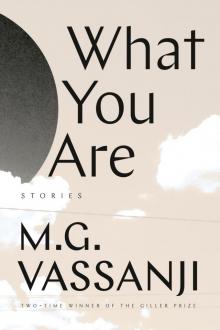 What You Are
What You Are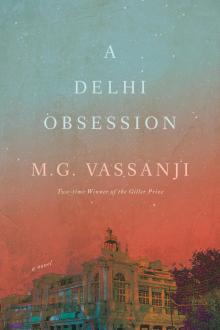 A Delhi Obsession
A Delhi Obsession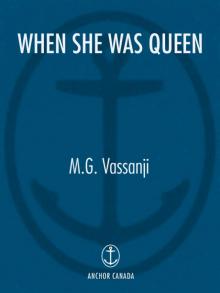 When She Was Queen
When She Was Queen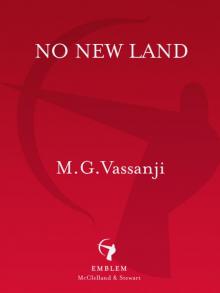 No New Land
No New Land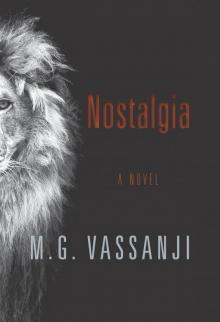 Nostalgia
Nostalgia Mordecai Richler
Mordecai Richler The Book of Secrets
The Book of Secrets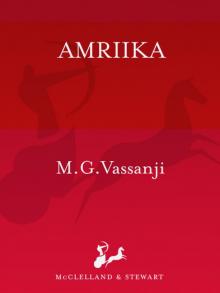 Amriika
Amriika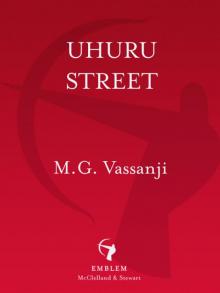 Uhuru Street
Uhuru Street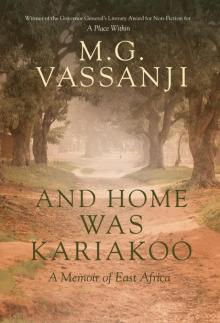 And Home Was Kariakoo
And Home Was Kariakoo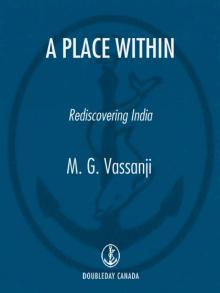 A Place Within
A Place Within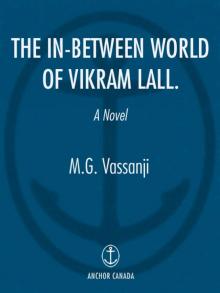 The In-Between World of Vikram Lall
The In-Between World of Vikram Lall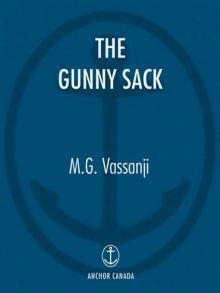 The Gunny Sack
The Gunny Sack